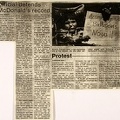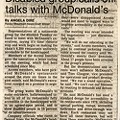El Paso Herald-Post
PHOTO (Herald-Post photo by John Hopper): Of an angry looking protester, Jim Parker, sitting in a manual wheelchair. He has shoulder length hair, a bandana headband, a goatee and moustache, black leather gloves with no fingers, and a black biker t-shirt. He is chained with a white link chain, to the doors of a business and has a sign in his lap, but it's not readable.
Caption reads: Jim Parker. a handicapped El Pasoan, readies his placard after chaining himself to a restaurant door Friday.
[Headline] Handicapped criticize lack of support
By Robert Palomares, El Paso Herald-Post
A group of protesters chained their wheelchairs to the doors of the McDonald's restaurant on Piedras Street and I-10 to protest the chain's “lack of commitment” to handicapped people.
Before his wheelchair was locked to door handles Friday, El Pasoan Jim Parker said that although McDonald’s provides funding for disabled people, the commitment doesn't include making the restaurants accessible to the handicapped.
"McDonald's has raised money for disabled people, but they don't make their restaurants accessible to us” Parker said.
“It's like saying, ‘We will give you this money, but you can't eat in our restaurants.”’ he said.
“This doesn’t mean they are exempt from providing us accessibility." said Mike Auberger of Denver.
Robert Keyser, a spokesman for McDonald's Corp. also was in El Paso for the protest.
Keyser said the protesters are not accurate when they say that the restaurants do not provide accessibility for handicapped people.
“Since 1979. McDonald’s standard building designs provide accessibility to the handicapped, even though local codes do not necessarily call for it.” Keyser said.
"In new construction table heights are considered" Keyser said. “We're not saying the restaurants should be modified overnight," said Bob Conrad, another protester from Denver. “But certainly new construction should have handicapped accessibility plans.”
Auberger, Conrad and others have traveled from city to city, protesting at McDonald’s restaurants.
The protesters say the height of the tables in the restaurant make it necessary for those in wheelchairs to sit in the restaurant's aisles.
“So far, these people have not made an attempt to talk to us,” Keyser said. “These people are using McDonald's to make a political statement. We don't do business as a result of threats,” he said.
The atmosphere inside the restaurant remained calm during the protest although customers did not know what was going on.
The protesters said they believed the action was successful and after about an hour unlocked themselves and left the restaurant.
Keyser said that McDonald's provides accessibility, “and will continue to work on ways to make our restaurants even more accessible, including improvements such as tables that are more convenient for our disabled customers,” he said.
- Created on
- Thursday 11 July 2013
- Posted on
- Monday 23 November 2015
- Tags
- accessible, blocking, Bob Conrad, El Paso, handicapped, Jim Parker, McDonalds, Mike Auberger, protest
- Albums
- Visits
- 2218
- Rating score
- no rate
- Rate this photo


0 comments